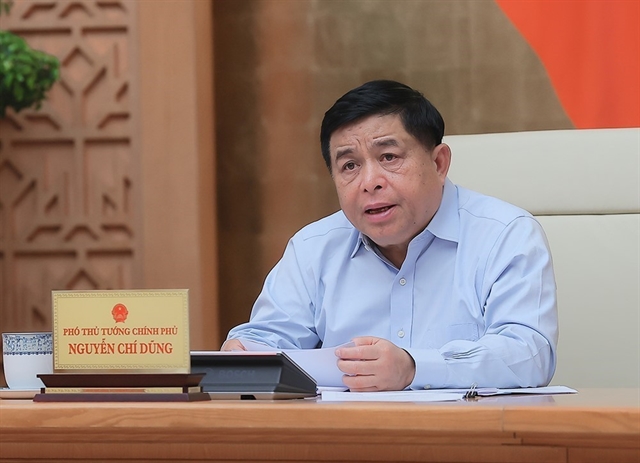 Politics & Law
Politics & Law
.jpg)
 |
| Deputy Prime Minister Nguyễn Chí Dũng chairs the meeting to review the progress and outcomes of interconnected and synchronised digital transformation in preparation for the scheme on Monday. VNA/VNS Photo |
HÀ NỘI — Deputy Prime Minister Nguyễn Chí Dũng asked for the seamless and efficient operation of the two-tier local administration model from July 1 onwards, while chairing a meeting to review the progress and outcomes of interconnected and synchronised digital transformation in preparation for the scheme on Monday.
This was the fourth meeting chaired by the Deputy PM in just over a week to ensure all necessary tasks are on track ahead of the official rollout of the new governance model on July 1.
Deputy Prime Minister Dũng applauded ministries, sectors, and localities for their efforts and responsibility in preparing for the July 1 milestone. However, he cautioned that these are new issues, and unforeseen challenges may still arise, urging all stakeholders not to be complacent and calling on them to keep closely watch on the situation.
He stressed that there must be no bottlenecks or interruptions that could disrupt administrative procedures, or the provision of online public services to citizens and businesses.
He requested to promptly remove difficulties and obstacles, quickly fix any incidents, and ensure adequate resources and personnel.
He urged the People’s committees of provinces and centrally‑run cities to review and promptly refine their regulations and procedures, ensure the timely receipt and resolution of administrative dossiers, and work with the Ministry of Science and Technology and technology enterprises to deploy sufficient infrastructure and equipment for stable, seamless, and secure operation of IT systems.
He called for close coordination with the Ministry of Public Security and service providers to guarantee information security and cyber‑safety across all IT platforms and terminal equipment, establish contingency plans for incident response, and set up permanent task forces responsible for monitoring, responding to, and resolving any security or network‑safety issues.
Meanwhile, the Ministry of Finance has been tasked with directing relevant agencies to urgently complete the issuance of tax identification numbers and budget‑relation codes for all localities by Monday, issue circulars and guidance documents detailing financial and budgetary mechanisms, public investment procedures, and public asset procurement for newly established or merged administrative units, and propose policy measures to support remote, mountainous, and island communes in overcoming network coverage gaps and shortages of necessary equipment for the implementation of the model.
The Ministry of Public Security and the Ministry of Science and Technology were requested to promptly establish working delegations immediately after July 1 to carry out unannounced supervision in localities, ensuring systems operate smoothly and provide optimal service to citizens.
According to Deputy Minister of Public Security, Lieutenant General Nguyễn Văn Long, the ministry has proposed localities publicise new administrative procedures and forms through mass media to ensure public awareness. He emphasised the need to restructure administrative procedures to enable the reuse of digitised data, thereby reducing required documents.
In addition, it is necessary to promptly define job positions of officials and civil servants involved in administrative procedures, in order to allocate USB tokens and digital certificates appropriately accordingly, and to revoke them when personnel are reassigned, he said.
He also stressed the need to guarantee the absolute security and integrity of all systems and equipment, noting that any outdated or underpowered devices susceptible to cyberattacks must be promptly upgraded or replaced.
Regarding the implementation of Plan No. 02-KH/BCDTW issued by the Central Steering Committee for the Development of Science, Technology, Innovation and Digital Transformation, Long noted that the ministry presided over the drafting of a Resolution on promoting data creation to serve comprehensive digital transformation in accordance with the Prime Minister's direction and sought opinions from ministries and sectors.
The Ministry of Public Security has proactively laid the groundwork for a smooth rollout of the two‑tier local administration model on July 1, focusing on developing detailed technical plans to update citizen records and overhaul the system architecture and software of the National Population Database, the ID Card Database, and the VNeID electronic identification and authentication platform.
Deputy Minister of Science and Technology Phạm Đức Long reported that most of the key targets have been basically completed. Local authorities have published procedures under 28 new decrees, including all internal workflows. All 34 provinces and centrally-run cities have configured their assigned services on the information system and they stand ready to provide public services to citizens starting July 1.
Long called on localities to focus on training officials, civil servants, and supporting enterprises involved in the scheme.
At the meeting, many localities expressed their readiness to deploy information systems and technology platforms in support of the official operation of the two-tier local government model starting July 1. — VNS
.jpg)



